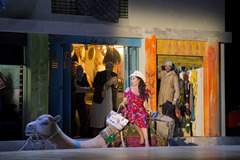| Opera Reviews | 26 April 2024 |
A production of absolute joyby Moore Parker |
|
| Rossini: L'Italiana in Algeri Salzburg Festival 18 August 2018 |
|
|
Mosche Leiser and Patrice Caurier, together with their production team, have set the piece in contemporary Algeria. Mustafà heads a local band of petty criminals who specialise in trading flat-screen TVs and other small electronics, while the Italian captives (including an Azzurro Savoia-shirted football team - performed here with relish by the male members of the Philharmonia Chor Wien) face threat at gunpoint if they don’t tow the line. Even poor Taddeo, who is stripped down to expose his Superman Y-fronts while ultimately acquiescing to join the ranks of the local Pappataci, has to first face a battery of handguns! Sun-bleached sets (Christian Fenouillat) convert easily from Mustafà and Elvira’s bedroom (in which the overture is amusingly used for the lady’s fraught efforts to seduce her spouse), into a dusty street of satellite dish-lined apartments and Isabella’s entrance on the back of a life-size model camel (just one of a selection of featured creatures including gulls, a herd of sheep, and a pet dog). Mustafà’s four-door Mercedes also makes an appearance before the stage is fully opened to reveal the Algerian macho’s salon - dominated by its garish row of striped seats (which serve as revolving vehicles for the protagonists to close Act 1 in the chaos of "Va sossopra il mio cervello"), and a line-up of colourful waterpipes waiting to be stoved. Act 2 features a mobile full-sized bubble-bath for Isabella’s wonderfully savoured "Per lui che adoro", while video (Étienne Guiol) elements augment on occasion - most significantly in a black and white film excerpt to accompany Haly’s "La femmine d’Italia". A glamorous white yacht appears to carry off the Italians, with Isabella and Lindoro taking Kate Winslet and Leonardo DiCaprio’s famous Titanic pose to bring down the curtain, and the happy ending. All a touch Daliesque - as are the delightfully vivid character portrayals, in a blissfully non-politicized reading aimed at pure entertainment. Cecilia Bartoli, undertaking the title role for the first time in this production, conquers as ever with her effervescent energy, charm, and skilled presentation. On this occasion she initially seemed to require some warm-up time vocally, with her mid-range somewhat lacking in sheen and odd moments above the stave a touch reserved, but the evening soon caught fire with Isabella’s lyrical passages most particularly serving the Italian mezzo’s ability to spin a fine legato and shape phrases to great effect, and with her familiar vocal dexterity well underscoring the staging’s animated demands. Delightfully scaled, this Isabella is an ideal mélange of impish chutzpah, no-nonsense fortitude, and kittenish sex appeal. Brava! Her Taddeo, Alessandro Corbelli, enjoys similar ranking - his inimitable stage craft always pregnant in nuance, timing, and expression while vocally belying a career of over four decades with his imposing, unwavering, and perfectly pitched baritone. Ildar Abdrazakov’s was born to play Mustafà with his larger-than-life personality and stature, and with a booming bass-baritone which ideally underscores the character’s overblown ego and dominating nature. The character’s development from a boorish gorilla to the bridled Pappataci is wonderfully paced, and is indeed a perfect foil for this Isabella. Again, astutely observed and enacted, Rebeca Olvera’s delightfully endearing characterisation of Elvira (here a subjugated provincial Muslim wife, bespectacled and a touch dowdy in style) is an artistic gem, underscored by a nicely-maturing lyric soprano that fits the part like a glove and projects effortlessly to crown Rossini’s soaring heights with aplomb. Edgardo Rocha’s dreadlocked Lindoro displayed a finely-spun tenore di grazia with many rewarding vocal moments, but remained a touch self-conscious and lacking in the confident nonchalance so abounding among his colleagues - in addition to the ultimate technical polish to yet make this a stellar reading. The main leads were well-supported by José Coca Loza, who showed marked potential with his confident and vocally solid Haly, Jean Chistophe Spinosi and his Ensemble Matheus maintained fine balance both in tempi and dynamics, always considerate of the singers - while possibly remaining a touch too discreet, and therefore failing to leave an artistic stamp on the proceedings to quite match the virtuosity of the cast and the staging team. All-in-all, however, a production of absolute joy.
|
|
| Text ©
Moore Parker Photo © Salzburger Festspiele / Monika Rittershaus |

 Returning to the Haus für Mozart from this year’s Whitsun Festival, this latest Salzburg Rossini scores an unequivocal hit with its colourful off-the-wall ideas and superb cast.
Returning to the Haus für Mozart from this year’s Whitsun Festival, this latest Salzburg Rossini scores an unequivocal hit with its colourful off-the-wall ideas and superb cast.





